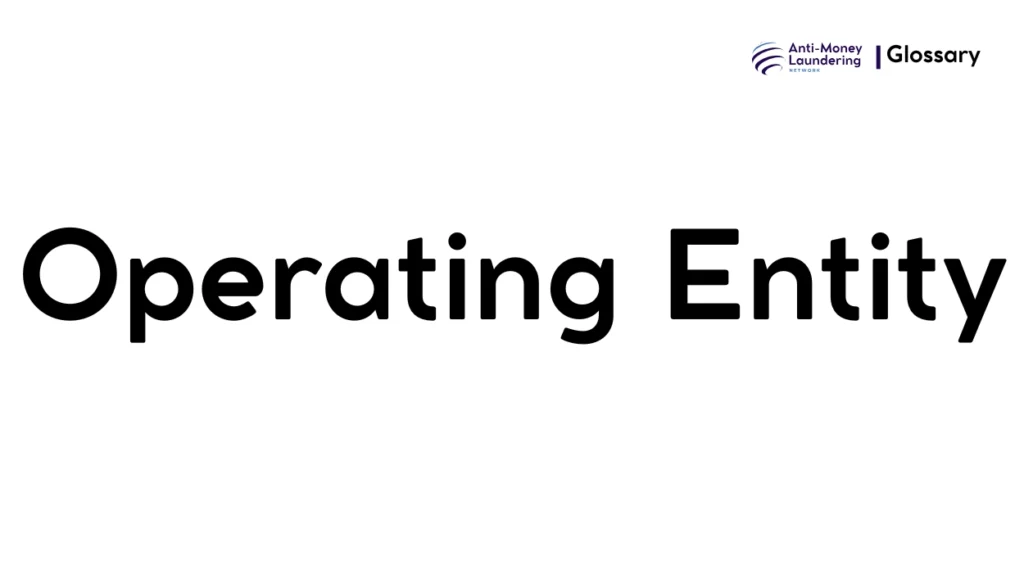Definition
In Anti-Money Laundering (AML) context, an “Operating Entity” refers to a business or organization—be it a legal person, corporate body, or natural person—that engages in commercial or financial activities requiring compliance with AML laws and regulations. This entity is directly responsible for executing business operations, including client interactions, transactions, and financial dealings, within the AML compliance framework. The operating entity is the subject of AML due diligence, monitoring, and regulatory oversight to prevent and detect money laundering and terrorist financing risks.
Purpose and Regulatory Basis
The operating entity concept matters because AML regulations aim to ensure all active participants in financial markets and relevant sectors maintain robust anti-money laundering controls. Operating entities are the entities whose activities expose the financial system to potential money laundering risks. Global regulatory standards such as those issued by the Financial Action Task Force (FATF), USA PATRIOT Act in the United States, and the European Union’s Anti-Money Laundering Directives (AMLD) establish frameworks obligating operating entities to implement comprehensive AML policies, customer due diligence, suspicious activity reporting, and ongoing compliance monitoring. AML compliance hinges on identifying and governing these entities to ensure transparency and accountability in financial transactions.
When and How it Applies
Operating entities come under AML regulations from the moment they commence activities involving financial transactions, client funds, or other monetary dealings subject to AML laws. This includes banks, money service businesses, real estate firms, casinos, trust and company service providers, and many non-financial sectors mandated by national laws. Typical triggers for AML application include establishing customer relationships, processing large or suspicious transactions, cross-border transfers, and conducting transactions on behalf of third parties. For example, a bank acting as an operating entity must apply AML controls on all deposit accounts, transfers, and financial services it offers.
Types or Variants
Operating entities can vary by industry sector and legal structure:
- Financial Institutions: Banks, credit unions, insurance companies, investment firms.
- Non-Financial Businesses and Professions: Casinos, real estate agents, jewelers.
- Money Service Businesses: Currency exchangers, money remitters.
- Corporate Structures: Parent companies, subsidiaries, branches operating in different jurisdictions.
Each type carries specific AML obligations depending on its risk exposure, regulatory environment, and activities conducted.
Procedures and Implementation
To comply with AML requirements, operating entities must:
- Develop written AML policies and procedures tailored to their risk profile.
- Implement customer due diligence (CDD) and enhanced due diligence (EDD) processes.
- Monitor transactions continuously for suspicious activities.
- Maintain records of transactions and customer identities.
- Train employees regularly on AML risks and protocols.
- Designate AML compliance officers responsible for oversight.
- Conduct periodic independent audits and risk assessments.
- Report suspicious transactions to Financial Intelligence Units (FIUs) as mandated.
Impact on Customers/Clients
From the customer’s perspective, dealing with an operating entity means undergoing identity verification, providing source-of-funds information, and compliance with enhanced due diligence in certain scenarios. Customers may experience restrictions such as transaction limits or additional scrutiny based on risk assessments. Transparency and data protection rights are respected under AML laws alongside compliance demands, ensuring customers’ privacy while mitigating financial crime risks.
Duration, Review, and Resolution
The AML obligations imposed on operating entities are ongoing throughout the lifespan of business relationships and relevant transactions. Regular review of policies, customer risk profiles, transaction monitoring, and compliance effectiveness is mandated. Resolution of identified risks involves escalation, investigation, potential reporting to authorities, and remediation measures including transaction blocking or account closure as required by law.
Reporting and Compliance Duties
Operating entities must document compliance activities comprehensively, including customer identification logs, transaction records, internal reports, and external filings with AML regulators or FIUs. Failure to meet these duties can lead to regulatory sanctions, fines, and reputational damage. Compliance roles within operating entities carry clear responsibilities to ensure adherence to AML laws and timely reporting.
Related AML Terms
The concept of operating entity intersects with many AML terms:
- Customer Due Diligence (CDD)
- Suspicious Activity Reporting (SAR)
- Financial Intelligence Unit (FIU)
- Beneficial Ownership
- Know Your Customer (KYC)
- Money Laundering Reporting Officer (MLRO)
- Enhanced Due Diligence (EDD)
Understanding operating entities helps clarify who in the compliance chain must take responsibility for AML controls.
Challenges and Best Practices
Common challenges for operating entities include managing complex ownership structures, cross-jurisdictional compliance, balancing privacy with transparency, and adapting to evolving AML risks. Best practices include adopting a risk-based approach, leveraging technology for transaction monitoring, ensuring regular staff training, and maintaining clear governance frameworks with empowered compliance officers.
Recent Developments
New trends impacting operating entities include increased regulatory convergence globally, digital identity verification solutions, AI-driven transaction analytics, and stricter data sharing protocols. Recent legislative updates like the EU AML Authority (AMLA) framework and updated FATF recommendations emphasize enhanced oversight and cooperation between national and international authorities affecting how operating entities implement AML controls.
The operating entity is a foundational concept in AML compliance, representing the active party conducting business operations subject to AML laws. Proper identification, regulation, and governance of operating entities ensure the integrity of the financial system against money laundering and terrorist financing threats. Financial institutions and other regulated entities must rigorously apply AML controls through these operating entities to meet global regulatory expectations and protect both themselves and their customers.

